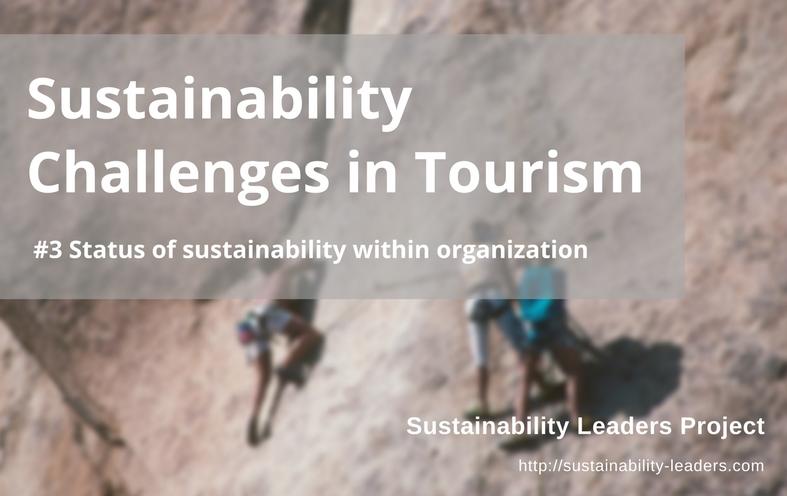
The status of sustainability within organizations is the focus of this third post of our special series on the key challenges preventing tourism businesses and destinations from becoming more sustainable.
In our interviews with tourism and sustainability professionals we often include a question about which they consider the main challenges regarding tourism sustainability. Among the many (and very diverse) answers so far, we’ve identified 10 themes and areas of concern. Low status of sustainability within organizations is one of them.
Below a few extracts and answers from our interviews, to offer you a snapshot of expert views on the topic. In some cases we have added the questions for better understanding (we usually adapt questions to the specific context of the person we interview). In any case, we strongly recommend you to read the full versions of the interviews. Sustainability challenges in tourism are very location-specific, and as such best understood in context.
Sustainable tourism challenge #3: status of sustainability within organization
D’Arcy Dornan, Brazil:
Interview
“While sustainability is more and more aligned with the strategic management of an organization/destination, it still does not receive priority status. To a certain degree, we still rely on the early adopters, those who have already understood and embraced sustainability. Others have been more hesitant but are now joining in as they see the mutual socioeconomic and environmental benefits. The remaining businesses and destinations will likely have to be persuaded via policy and regulatory frameworks that make sustainability mandatory.”
Stewart Moore, Australia:
Interview
As management consultant, which sustainability issues do your clients struggle with most?
“The need to incorporate sustainability as a central part of brand and corporate strategy. Sustainability is about what you do, it is not a label or a stamp. If the GM/CEO does not have sustainability as a key KPI in their PD then the company is not serious about delivering real outcomes. Talk is cheap!”
Madeline Svelti-Diaz, Mexico:
Interview
Which areas at your hotel are the most difficult to gear towards sustainability?
“The most difficult are the senior executives and management, mostly because the people who are part of these areas have so many responsibilities, which lead them to leave the social responsibility and environmental protection aside. This is why we must insist and make them understand the importance of sustainable practices and at the end they always come and enjoy the process as anyone.”
Vicente Ferreyra Acosta, Mexico:
Interview
What is the greatest challenge in working for an international NGO like WWF?
“I think the greatest challenge is integrating a tourism agenda into the objectives and guidelines of the organization. With a presence in more than 100 countries, global challenges like climate change, unsustainable fisheries, resource consumption, illegal hunting, deforestation, among others, get the attention of organizations like WWF.
And tourism, being an important economic sector, is not really integrated as a priority into the policy of the organization. Documenting the importance of working in this activity is vital in achieving support from the organization in advancing the search for sustainability in tourism.”
Thoughts:
The low status which sustainability issues still have in some tourism organizations and businesses might surprise, but from what we hear this is changing rapidly. For example, Antonia del Toro in her interview told us how the hotel chain she works for has only a few years ago made the switch from considering sustainability a CSR [corporate social responsibility] topic, to now fully embracing it as business goal and strategic advantage.
More and more tourism brands now engage with sustainability as an opportunity to enhance their reputation and grow or maintain competitive advantage. The business case for sustainability is emerging as alternative to philanthropic activities aimed at supporting local communities and preserving the natural environment in a less strategic manner. And with destination overcrowding and “overtourism” on the rise, pressure for this change to happen, faster, will continue to grow.
Articles on sustainable tourism challenges published so far:
- Achieving Sustainable Tourism: These Are the Key Challenges
- Sustainable Tourism Trends and Challenges in 2019: Expert Panel
- 11 Challenges for Sustainability Entrepreneurs in Tourism: Pitfalls to Avoid
Please note that the information and views set out in this article are those of the authors (interviewees) and do not necessarily reflect the official opinion of the organizations they work for.
Enjoyed this snapshot of expert views on why the status of sustainability within organizations constitutes a key challenge for tourism businesses and destinations? Share and spread the word!











